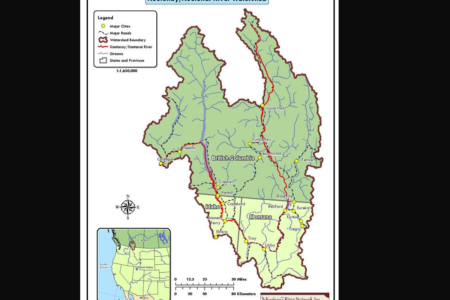AMEC Lays Off 18 in Trail Office
Kicking off the new year in similar fashion to many struggling corporations worldwide, one of Trail’s larger employers AMEC, laid off 18 workers in its Trail office as mining projects by its clients are being delayed or held off on decreasing their workload.
Headquartered in London England and listed on the London Stock Exchange AMEC employs in total approximately 23,000 employees over three divisions; Natural Resources, Power and Process and Earth and Environmental working primarily in project management in engineering.
The mining end of AMEC’s business is headquartered out of Vancouver falling under the Natural Resources division of which the Trail office works inside of AMEC’s Trail office now currently employs approximately 80 employees providing engineering, project management and construction management.
Speaking with AMEC’s Vice President of North American Mining Operations based out of the Oakville Ontario office earlier this week, he explained the reasoning behind the Trail office layoffs.
“Of course we’re saddened by their departure. We are working closely with all of the people that were affected to ease their transition. What we found and it’s probably no surprise that a lot of our clients across our business are cancelling their projects and delaying their projects. Trail is very similar to our other offices whether it’s Vancouver or Oakville or Phoenix. Saskatoon seems to be the only place on the planet that is somewhat insulated from what is going on around the planet with Potash still being very strong. The way we deal with that situation at AMEC is we try and spread our work across our offices. We try to move the work, basically balancing our portfolio of projects, that’s how we try to deal with the fluctuations in the workload so we don’t have to take really really drastic measures. Of course it’s difficult to achieve perfection in that regard.”
Over the past three years AMEC has worked to develop collaborative online systems between its offices to allow for employees regardless of location to work together on projects. These systems have allowed the company among other benefits to better weather the current economic downturn by better sharing workloads between offices to lessen the impact on any one particular office.
“We made a huge investment in the last few years in collaborative web based design tools so in the last two years we’ve had a real focus on PDMF’s and three dimensional design tools that are accessible through the web. What that allows us to do is we can have a project in say Saskatoon where the 3d model resides and we can have people in Trail and Toronto working on it real time. It helps us when the times are tough just because one of our offices gets hit with project cancellations it allows us to spread the work around a bit,” spoke Steve Ciccone “We’re lucky that this world crash didn’t happen about 2 years ago before we had the collaborative online abilities as then it would have had a much larger impact on some of our offices.”
Enabling the online collaboration tools has increased the opportunity for the Trail office in particular as apart from the Teck operations Trail is relatively off the beaten track of the worlds mining business.
“As an example, over the past three years, our Trail office is working collaboratively with our Lima Peru and Santiago Chile offices on a refinery expansion operation in Lima. It is kind of neat that you can live in the Kootenays and work on projects around the world. You don’t often get that opportunity in small towns.”
When deciding on who to lay off and in what offices, AMEC looked closely at their current workload and current skills required to complete that work and chose to keep the people best suited to the work they have available as opposed to any sort of seniority type scenario.
While 18 well paying jobs being lost in a community of 8,500 is a significant impact on the local workforce, speaking with one of the laid off workers from the Trail office who preferred to remain anonymous, it was clear that although the layoffs were a surprise to some, there are few hard feelings towards the employer.
“They are a great company, and I’m sad that I don’t get to go to work with great people, but it is a sign of the times…I think they’re trying their best in a really tough time, but it is effecting the global economy (when Toyota and Microsoft lay people off – yikes). I guess we all have to be prepared, and I think some people were caught off guard… Twenty jobs may not seem like much, but in a town of 8500 (Trail), it’s fairly significant.”
Ciccone of AMEC noted that the company is working with the laid off employees to as best they can ease the transition process for them.
“Typically we use outplacement agencies for those individuals and we do some of it internally as well, so we help with the job hunt, resumes and that type of thing, really trying to help people ease into what best suits them,” described Ciccone.
These sentiments were echoed also by one of the laid off employees describing the company’s efforts to ease the transition process out of their previous jobs.
“They are being good with benefits, extending some of the deadlines, and keeping in touch. I personally haven’t heard anything in terms of placements or programs, but maybe they are coming. I have heard that quite a few people are going to Saskatoon to help with the potash jobs, but personally I haven’t as of yet heard anything. I know they are trying to get the Records of Employment out as quickly as possible. I do believe that when things get better, people will get re-hired, and return (if they so choose) from placements.”
When asked about the future of the company and if any other layoffs are anticipated in the near future Ciccone explained that he is still very much an optimist, that their existing work is fairly stable and further layoffs are not anticipated at this time.
“I don’t know that any of us can see what might be around the corner,” explained Ciccone. “I certainly don’t anticipate anything major in the near future. I think the future is bright in Trail particularly because our people in Trail can work on projects that aren’t right in Trail. For example this potash project that we are just starting in new Mexico which may seem odd, a potash project in New Mexico being done in Trail, but the right kinds of skills are available in our trail office for that project.”
For the time being, while a difficult situation to deal with the laid off employees talked to are going in various different routes from relocating to other AMEC offices, taking the opportunity to retrain in new fields and in other cases taking a break and enjoying life in the Kootenays for the time being with hopes that AMEC will be rehiring some of these positions as the economy turns around.

























